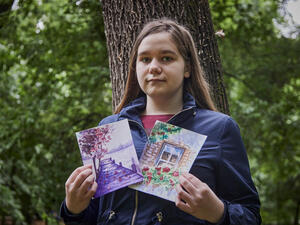Sudanese refugee uses scraps and camp waste to make life more comfortable
Sudanese refugee uses scraps and camp waste to make life more comfortable

Sadik's presence stands out - a slender metal and bamboo structure bristling with wires, antenna and a home-made satellite dish for radio and TV looms over his workshop.
BONGA REFUGEE CAMP, Ethiopia, August 10 (UNHCR) - Repan Sadik is a modern-day Heath Robinson, creating fantastic contraptions out of odds and ends and other people's waste. The late British cartoonist and illustrator depicted his famous madcap inventions on paper, but Sadik's creations are concrete, really work and help to make his life in an Ethiopian refugee camp more comfortable and enjoyable.
For his ingenuity and determination, the 20-year-old Sudanese refugee won a UNHCR "Courage Award" last year and promptly spent the prize money of US$250 on parts and tools to build a television set. At the time, UNHCR official Ilunga Ngandu, said he hoped the award would further motivate Sadik "to keep on striving for excellence and to serve your family and community better."
He's been doing that for quite some time in this camp of 17,000 refugees in western Ethiopia, which his family fled to in 1987 to escape fighting between rebel militias and government forces in southern Sudan. Neighbours dub Sadik the "refugee scientist" and he hopes that his skills can help him win a scholarship to study electronics overseas.
Sadik's presence stands out - a slender metal and bamboo structure bristling with wires, antenna and a home-made satellite dish for radio and TV looms over his workshop. He lives in a thatched mud hut with his wife and child. Inside, it's a treasure trove of electronic equipment and gadgets - all made by Sadik from discarded material found in the camp.
"I made a ventilator using old magnets and oil tins which cooled my otherwise very hot refugee cottage," said Sadik. "After proving that this was working well, I made four more and gave them to my mother and friends."
The well-lit shelter - powered by a heavy duty battery - also boasts a home-made tape recorder, CD player, radio, and the TV. They have all been constructed from scraps, including oil cans, used aluminium foil, old wire and cartons. "New materials are out of reach for me and I had to resort to discarded items to achieve my goal of creating something new and usable in the camp," Sadik said.
The UNHCR cash prize has allowed him to become more ambitious. He bought wire, magnets, dry cell batteries, a cutter, scissors and other items for his television and is now working on building a telephone and a solar energy device. "My family and neighbours now assemble in my room to watch ETV [Ethiopian Television] programmes," said Sadik.
Sadik believes his talent is innate - but it was nurtured along the way by UNHCR and others. His father was a blacksmith, he said, adding that while he used to watch the older man craft objects out of metal, "the things my father used to do are completely different from the ones I am doing."
A formative experience came about six years ago when his mother gave him some money to buy "a bit to bite." He went to the town of Gambella and was fascinated by a torch in an ironmonger's store. "That little light-emitting device challenged my imagination," recalled Sidak, who forgot about his hunger and spent the pocket money on the torch.
In a classic case of reverse engineering, he dismantled the device so that he could find out how it worked. Armed with this information he built two head lamps from scraps scavenged around the camp and went around at night sporting his new invention.
It caused a stir. "We were all baffled to see Repan [Sidak] walking in the dark, with his head emitting light," said fellow refugee Yuram Inn. "Once we discovered that these were flash lights and they were his own creation, all of us were awe-stricken."
Word of the refugee scientist reached UNHCR and other humanitarian groups. "A UNHCR staff member gave me some old wires and discarded car battery, with which I succeeded in putting together a radio set," Sidak said.
UNHCR's Ngandu was so impressed by the young man that he told the refugee agency's representative in Gambella to arrange for Sadik to learn English so he could read science manuals. "To be able to exploit his potential to the maximum possible, he needs to be taken to a good school and UNHCR calls for the support of the international community to help this young man of immense potential," Ngandu said.
Sadik does want to go home, but he also wants to study to become a qualified electronics engineer and he knows that is not possible in the southern Sudan. "I plead with the UN refugee agency to resettle me in a third country where I can have access to education," he said with emotion. "If given the chance, believe me I will transform myself into someone who will be bring pride to the African continent."
By Kisut Gebre Egziabher in Bonga Refugee Camp, Ethiopia








